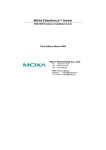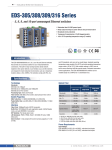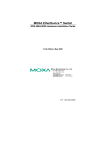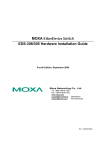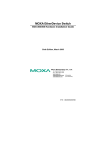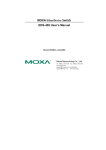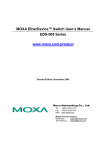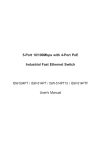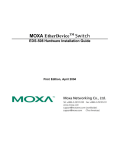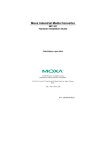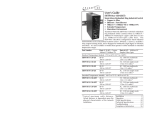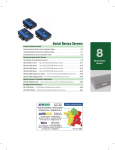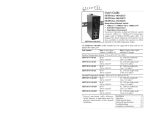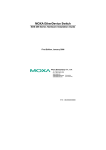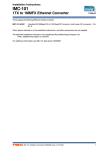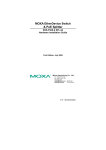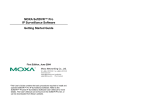Download EDS-405 User`s Manual
Transcript
MOXA EtherDevice™ Switch EDS-405 User’s Manual Fourth Edition, March 2005 Moxa Networking Co., Ltd. Tel: Fax: Web: +886-2-2910-1230 +886-2-2910-1231 www.moxa.com MOXA Technical Support Worldwide: [email protected] The Americas [email protected] TM MOXA EtherDevice Switch EDS-405 User’s Manual The software described in this manual is furnished under a license agreement and may be used only in accordance with the terms of that agreement. Copyright Notice Copyright 2005 Moxa Networking Co., Ltd. All rights reserved. Reproduction without permission is prohibited. Trademarks MOXA is a registered trademark of the Moxa Group. All other trademarks or registered marks in this manual belong to their respective manufacturers. Disclaimer Information in this document is subject to change without notice and does not represent a commitment on the part of Moxa. Moxa provides this document “as is,” without warranty of any kind, either expressed or implied, including, but not limited to, its particular purpose. Moxa reserves the right to make improvements and/or changes to this manual, or to the products and/or the programs described in this manual, at any time. Information provided in this manual is intended to be accurate and reliable. However, Moxa assumes no responsibility for its use, or for any infringements on the rights of third parties that may result from its use. This product might include unintentional technical or typographical errors. Changes are periodically made to the information herein to correct such errors, and these changes are incorporated into new editions of the publication. Table of Contents Chapter 1 Introduction .................................................... 1-1 Overview ........................................................................... 1-2 Package Checklist ........................................................... 1-3 Product Features ............................................................. 1-3 Panel Layout of EDS-405............................................... 1-4 Panel Layout of EDS-405-MM/SS-SC.......................... 1-5 Panel Layout of EDS-405-MM-ST ................................ 1-6 Chapter 2 Installing EDS-405 .......................................... 2-1 Mounting Dimensions ..................................................... 2-2 DIN-Rail Mounting ........................................................... 2-3 Wall Mounting (Optional) ................................................ 2-4 Chapter 3 Wiring EDS-405............................................... 3-1 Wiring Requirements....................................................... 3-2 Grounding EDS-405........................................................ 3-4 Wiring the Alarm Contact................................................ 3-5 Wiring the Redundant Power Inputs ............................. 3-6 Communication Connections......................................... 3-7 10/100BaseT(X) Ethernet Port Connection...... 3-7 100BaseFX Fiber Port Connection .................... 3-8 Chapter 4 How to Use EDS-405 ...................................... 4-1 Supported Ethernet Network Topologies ..................... 4-2 Redundant Ring Topology................................... 4-2 Star-Wired Topology............................................. 4-3 MOXA Turbo Ring Setup ................................................ 4-4 Front Panel LED Indicators ............................................ 4-7 Dip Switch Settings ......................................................... 4-8 Upgrading the Firmware ................................................. 4-9 Basic Switching Function ............................................. 4-11 Auto MDI/MDI-X Connection ............................ 4-11 Fiber Ports ........................................................... 4-11 Dual Speed Functionality and Switching......... 4-12 Switching, Filtering, and Forwarding ............... 4-12 Switching and Address Learning...................... 4-13 Auto-Negotiation and Speed Sensing ............. 4-13 Appendix A Product Specifications...................................A-1 Appendix B Service Information ....................................... B-1 MOXA Internet Services ................................................ B-2 Problem Report Form .................................................... B-3 Product Return Procedure ............................................ B-4 1 Chapter 1 Introduction Welcome to MOXA EDS-405 Series, the new generation of EtherDevice™ Switch that comes with “MOXA Turbo Ring,” developed by Moxa for industrial Ethernet switches. With this plug-n-play ring redundancy solution, your industrial automation and control applications can operate non-stop. The following topics are covered in this chapter: Overview Package Checklist Product Features Panel Layout of EDS-405 Panel Layout of EDS-405-MM/SS-SC Panel Layout of EDS-405-MM-ST EDS-405 User’s Manual Overview EDS-405 Series, the new generation of EtherDevice™ Switch, includes 4 models: EDS-405, EDS-405-MM-SC, EDS-405-SS-SC, and EDS-405-MM-ST, referred to collectively as EDS-405. EDS-405 is a 5-port Ethernet switch specially designed for industrial automation and control systems. It comes with the plug-n-play MOXA Turbo Ring, which is used to establish an Ethernet redundant ring topology. Turbo Ring can begin transmitting automatically over a redundant path in under 300 ms, increasing the reliability of your system. The built-in relay output function helps you monitor each port’s link status, each power input’s status, and the health of the Turbo Ring topology. This relay output warning function enables your maintenance engineers to react promptly to emergency situations. Commercial Ethernet switches need 3 to 5 minutes to recover the connection when you unplug your device from one port, and then plug it into another port for field diagnosis. The Line-Swap Fast Recovery feature responds in less than 1 second, allowing you to complete your diagnosis in a much shorter time period. EDS-405 has a wide operating temperature range of -40 to 75°C, and is designed to withstand a high degree of vibration and shock. The rugged hardware design makes EDS-405 perfect for ensuring that your Ethernet equipment can withstand critical industrial applications, such as in hazardous locations (UL/cUL Class 1 Division 2 and ATEX Class 1 Zone 2), and complies with FCC, TÜV, UL, and CE Standards. The redundant dual DC power inputs give you extra assurance that your switch will operate non-stop, and the versatile installation options—by DIN-Rail or wall mounting—makes it easy to fit EDS-405 into any environment. 1-2 Introduction Package Checklist MOXA EDS-405 is shipped with the following items: Standard Accessories y 1 Switch: EDS-405, EDS-405-MM-SC, EDS-405-SS-SC, or EDS-405-MM-ST y EDS-405 User’s Manual y Product Warranty Booklet y Protective caps for unused ports Optional Accessories y WK-46 Wall Mounting Kit NOTE: Notify your sales representative if any of the above items is missing or damaged. Product Features EDS-405 has the following features: y y y y y y y Plug-n-play, ring redundancy solution (recovery time < 300 ms) Relay output alarm for power failure, port break, or Turbo Ring break. 10/100M, full/half-duplex, MDI/MDI-X auto-sensing for 100BaseT(X) port Redundant dual DC power inputs Line-Swap Fast Recovery (patent pending) DIN-Rail or optional wall mounting Operating temperature ranges from 0 to 60°C, or extended operating temperature from -40 to 75°C for “-T” models 1-3 EDS-405 User’s Manual Panel Layout of EDS-405 Top View 1 1. 2. V2+ PWR2 V2FAULT 2 V1+ V1 V2 INPUTS 12-48 VDC PORT ALARM RING MASTER 6 OFF ON Front View 5 6 7 PWR1 PWR2 5 FAULT 8 RING MASTER 4 3 100M 1 13 14 13 1-4 9 2 11 Rear View Power input PWR1 LED Power input PWR2 LED Fault LED Ring Master LED TP port’s 100 Mbps LED TP port’s 10 Mbps LED Model Name 10/100BaseT(X) Port DIP P5 3 ON P4 1 2 3 4 5 P2 P3 P5 12 5. 6. 7. 8. 9. 10. 11. 12. PWR1 V1- P1 4 3. 4. Grounding screw Terminal block for power input PWR1/PWR2 and relay output Heat dissipation orifices Dip switches EDS-405 2 10M 10 1 13. Screw hole for optional wall mounting kit 14. DIN-Rail kit Introduction Panel Layout of EDS-405-MM/SS-SC Top View 1 V2+ PWR2 V2FAULT 2 V1+ V1 V2 INPUTS 12-48 VDC P5 1. 2. PORT ALARM RING MASTER 6 P5 DIP P4 3 ON P2 P3 1 2 3 4 5 P1 4 PWR1 V1- OFF ON Front View 5 6 7 PWR1 PWR2 5 12 FAULT 100M 8 RING MASTER 12 4 13 100M 3 100M 1 11 Rear View 14 2 EDS-405-MM-SC 2 NOTE: The appearance of EDS-405-SS-SC is identical to EDS-405-MM-SC. 10M 9 10 1 3. 4. Grounding screw Terminal block for power input PWR1/PWR2 and relay output Heat dissipation orifices Dip switches 5. 6. 7. 8. 9. 10. 11. 12. 13. Power input PWR1 LED Power input PWR2 LED Fault LED Ring Master LED TP port’s 100 Mbps LED TP port’s 10 Mbps LED Model Name 100BaseFX Port (Single/Multi Mode) FX port’s 100 Mbps LED 14. Screw hole for optional wall mounting kit 15. DIN-Rail kit 15 14 1-5 EDS-405 User’s Manual Panel Layout of EDS-405-MM-ST Top View 1 1. 2. V2+ PWR2 V2FAULT 2 V1+ V1 V2 INPUTS 12-48 VDC PORT ALARM Power input PWR1 LED Power input PWR2 LED Fault LED Ring Master LED TP port’s 100 Mbps LED TP port’s 10 Mbps LED Model Name 100BaseFX Port (Multi Mode) FX port’s 100 Mbps LED DIP P5 3 ON P4 1 2 3 4 5 P2 P3 RING MASTER 6 P5 OFF ON Front View 5 6 7 PWR1 PWR2 5 12 FAULT 100M 8 RING MASTER 12 5. 6. 7. 8. 9. 10. 11. 12. 13. PWR1 V1- P1 4 3. 4. Grounding screw Terminal block for power input PWR1/PWR2 and relay output Heat dissipation orifices Dip switches 4 13 100M 3 100M 1 11 Rear View 14 15 14 1-6 2 EDS-405-MM-ST 2 10M 9 10 1 14. Screw hole for optional wall mounting kit 15. DIN-Rail kit 2 Chapter 2 Installing EDS-405 This chapter includes information about how to install EDS-405. The following topics are covered: Mounting Dimensions DIN-Rail Mounting Wall Mounting (Optional) EDS-405 User’s Manual Mounting Dimensions 21.00 30.00 54.00 9.50 Side View 135.00 (unit = mm) 105.00 25.71 15.10 13.10 25.40 PWR1 PWR2 5 + + + + 39.37 FAULT RING MASTER 13.90 18.20 13.90 9.75 + 6 + 26 + 10 + 10 + 5 30.50 7.75 7.75 13 18 13 3.50 + + 6.00 3.50 + + 6.00 + 4 3 1 2 EDS-405 Front View 2-2 23.15 46.77 135.00 + + + + + + + + Rear View + + Panel Mount Kit Installing EDS-405 DIN-Rail Mounting The aluminum DIN-Rail attachment plate should already be fixed to the back panel of EDS-405 when you take it out of the box. If you need to reattach the DIN-Rail attachment plate to EDS-405, make sure the stiff metal spring is situated towards the top, as shown in the figures below. 1. Insert the top of the DIN-Rail into the slot just below the stiff metal spring. metal spring DIN-Rail 2. The DIN-Rail attachment unit will snap into place as shown below. metal spring DIN-Rail 3. To remove EDS-405 from the DIN-Rail, simply reverse Steps 1 and 2 above. 2-3 EDS-405 User’s Manual Wall Mounting (Optional) For some applications, you will find it convenient to mount EDS-405 on the wall, as illustrated below. 1. Remove the aluminum DIN-Rail attachment plate from EDS-405’s rear panel, and then attach the wall mounting plates, as shown in the diagram below. top plate ⇒ bottom plate 2. 6.0 mm Mounting EDS-405 on the wall requires 4 screws. Use EDS-405, with wall mount plates attached, as a guide to mark the correct locations of the 4 screws. The heads of the screws should be less than 6.0 mm in diameter, and the 3.5 mm shafts should be less than 3.5 mm in diameter, as shown in the figure below. Do not screw the screws in all the way—leave about 2 mm to allow room for sliding the wall mount panel between the wall and the screws. NOTE 2-4 Before tightening the screws into the wall, make sure the screw head and shank size are suitable by inserting the screw into one of the keyhole-shaped apertures of the Wall Mounting Plates. Installing EDS-405 3. Once the screws are fixed in the wall, insert the four screw heads through the large parts of the keyhole-shaped apertures, and then slide MOXA EDS-405 downwards, as indicated below. Tighten the four screws for stability. PWR1 PWR1 PWR2 5 PWR2 5 FAULT FAULT RING MASTER RING MASTER 4 4 3 3 100M 1 2 EDS-405 10M 100M 1 2 EDS-405 10M 2-5 3 Chapter 3 Wiring EDS-405 This chapter includes information about wiring EDS-405. The following topics are covered: Wiring Requirements Grounding EDS-405 Wiring the Alarm Contact Wiring the Redundant Power Inputs Communication Connections ¾ 10/100BaseT(X) Ethernet Port Connection ¾ 100BaseFX Fiber Port Connection EDS-405 User’s Manual Wiring Requirements In this section, we point out several items that you should pay attention to before proceeding with your installation. WARNING Do not disconnect modules or wires unless the power supply has been switched off or the area is known to be non-hazardous. The devices may only be connected to the supply voltage shown on the type plate. The devices are designed for operation with a Safety Extra-Low Voltage. Thus, they may only be connected to the supply voltage connections and to the signal contact with the Safety Extra-Low Voltages (SELV) in compliance with IEC950/ EN60950/ VDE0805. WARNING Substitution of components may impair suitability for Class I, Division 2 and Zone 2.These devices must be supplied by a SELV source as defined in Low Voltage Directive 73/23/EEC and 93/68/EEC. WARNING This equipment has been evaluated as EEx nC IIC T4 equipment under DEMKO Certificate No. 03 ATEX 0324537U. Each module is II 3G and is suitable for use in Zone 2 Explosive marked Atmospheres. The device must be installed in a minimum IP 54 enclosure as defined in IEC 60529 and EN 60529. 3-2 Wiring EDS-405 ATTENTION This unit is a built-in type. When the unit is installed in another piece of equipment, the equipment enclosing the unit must comply with fire enclosure regulation IEC 60950/EN60950 (or similar regulation). ATTENTION Safety First! Be sure to disconnect the power cord before installing and/or wiring your MOXA EtherDevice Switch. ATTENTION Wiring Caution! Calculate the maximum possible current in each power wire and common wire. Observe all electrical codes dictating the maximum current allowable for each wire size. If the current goes above the maximum ratings, the wiring could overheat, causing serious damage to your equipment. You should also pay attention to the following items: y Use separate paths to route wiring for power and devices. If power wiring and device wiring paths must cross, make sure the wires are perpendicular at the intersection point. y NOTE: Do not run signal or communication wiring and power wiring in the same wire conduit. To avoid interference, wires with different signal characteristics should be routed separately. 3-3 EDS-405 User’s Manual y You can use the type of signal transmitted through a wire to determine which wires should be kept separate. The rule of thumb is that wiring that shares similar electrical characteristics can be bundled together. y Keep input wiring and output wiring separate. y Where necessary, it is strongly advised that you label wiring to all devices in the system. Grounding EDS-405 Grounding and wire routing help limit the effects of noise due to electromagnetic interference (EMI). Run the ground connection from the ground screw to the grounding surface prior to connecting devices. ATTENTION This product is intended to be mounted to a well-grounded mounting surface such as a metal panel. 3-4 Wiring EDS-405 Wiring the Alarm Contact The Alarm Contact consists of the two middle contacts of the terminal block on EDS-405’s top panel. To wire the Alarm Contact, use 2 wires and connect one end of the wires to EDS-405’s alarm contract. The other end of the 2 wires should be connected to your alarm devices. We will explain the meaning of the two contacts used to connect the Alarm Contact in the following section. FAULT Top View FAULT: The two middle contacts of the 6-contact terminal block connector are used to detect both power faults and port faults. The two wires attached to the Fault contacts form an open circuit when: 1. FAULT Front View EDS-405 has lost power from one of the DC power inputs, OR 2. One of the ports for which the corresponding PORT ALARM Dip Switch is set to ON is not properly connected, OR 3. EDS-405 becomes the Ring Master of this Turbo Ring after the Turbo Ring was broken. If none of these 3 conditions occur, the Fault circuit will be closed. 3-5 EDS-405 User’s Manual Wiring the Redundant Power Inputs The top right and left two contacts and the bottom two contacts of the 6-contact terminal block connector on EDS-405’s top panel are used for EDS-405’s two DC inputs. Top and front views of one of the terminal block connectors are shown here. Top View Front View STEP 1: Insert the negative/positive DC wires into the V-/V+ terminals. STEP 2: To keep the DC wires from pulling loose, use a small flat-blade screwdriver to tighten the wire-clamp screws on the front of the terminal block connector. STEP 3: Insert the plastic terminal block connector prongs into the terminal block receptor, which is located on EDS-405’s top panel. EDS-405 has dual power inputs that can be connected simultaneously to live DC power sources. If one power source fails, the other live source acts as a backup, and automatically supplies all of MOXA EDS-405’s power needs. 3-6 Wiring EDS-405 Communication Connections EDS-405-MM-SC/ST has 3 10/100BaseT(X) Ethernet ports, and 2 100BaseFX, multi-mode fiber ports (SC/ST-type connector). EDS-405-SS-SC has 3 10/100BaseT(X) Ethernet ports and 2 100BaseFX, single-mode fiber ports (SC-type connector). EDS-405 has 5 10/100BaseT(X) Ethernet ports. 10/100BaseT(X) Ethernet Port Connection The 10/100BaseT(X) ports located on the front panel of EDS-405 are used to connect to Ethernet-enabled devices. Below we show pinouts for both MDI (NIC-type) ports and MDI-X (HUB/Switch-type) ports, and also show cable wiring diagrams for straight-through and cross-over Ethernet cables. RJ45 (8-pin, MDI-X) Port Pinouts RJ45 (8-pin, MDI) Port Pinouts 8-Pin Description 8-Pin Description 1 2 3 6 Tx+ TxRx+ Rx- 1 8 1 2 3 6 Rx+ RxTx+ Tx- 1 8 RJ45 (8-pin) to RJ45 (8-pin) Straight-Through Cable Wiring Straight-Through Cable Switch Port RJ45 Connector Tx+ TxRx+ Rx- NIC Port RJ45 Plug Pin 1 RJ45 Connector Cable Wiring 3 6 1 2 3 6 1 2 Rx+ RxTx+ Tx- 3-7 EDS-405 User’s Manual RJ45 (8-pin) to RJ45 (8-pin) Cross-Over Cable Wiring Cross-Over Cable Switch Port (NIC Port) RJ45 Plug Pin 1 RJ45 Connector (Rx+) (Rx-) (Tx+) (Tx-) Tx+ TxRx+ Rx- Switch Port (NIC Port) RJ45 Connector Cable Wiring 3 6 1 2 1 2 3 6 Rx+ RxTx+ Tx- (Tx+) (Tx-) (Rx+) (Rx-) 100BaseFX Fiber Port Connection The concept behind the SC/ST port and cable is quite straightforward. Suppose you are connecting devices I and II. Contrary to electrical signals, optical signals do not require a circuit in order to transmit data. Consequently, one of the optical lines is used to transmit data from device I to device II, and the other optical line is used to transmit data from device II to device I, for full-duplex transmission. All you need to remember is to connect the Tx (transmit) port of device I to the Rx (receive) port of device II, and the Rx (receive) port of device I to the Tx (transmit) port of device II. If you are making your own cable, we suggest labeling the two sides of the same line with same letter (A-to-A and B-to-B, as shown below). SC-Port to SC-Port Cable Wiring SC-Port Pinouts Tx 3-8 A B B Fiber Port Fiber Port SC Connector Rx A Tx Rx Cable Wiring A B A B SC Connector Rx Tx Wiring EDS-405 ST-Port to ST-Port Cable Wiring ST-Port Pinouts Tx ST Connector Rx A A B B Fiber Port Fiber Port Tx Rx Cable Wiring A B A B ST Connector Rx Tx ATTENTION This is a Class 1 Laser/LED product. Do not stare directly into the Laser/LED beam. 3-9 4 Chapter 4 How to Use EDS-405 In this chapter, we give a general idea of how to use EDS-405. Some users will simply want to plug in the power, connect the switch to their Ethernet-enabled devices, and then go to work right away. Other users will want to utilize EDS-405’s basic device management functions, whereas some will want to make full use of EDS-405’s advanced device management functions. This chapter includes the following sections: Supported Ethernet Network Topologies ¾ Redundant Ring Topology ¾ Star-Wired Topology MOXA Turbo Ring Setup Front Panel LED Indicators Dip Switch Settings Upgrading the Firmware Basic Switching Function ¾ Auto MDI/MDI-X Connection ¾ Fiber Ports ¾ Dual Speed Functionality and Switching ¾ Switching, Filtering, and Forwarding ¾ Switching and Address Learning ¾ Auto-Negotiation and Speed Sensing EDS-405 User’s Manual Supported Ethernet Network Topologies Redundant Ring Topology Moxa developed the proprietary Turbo Ring protocol for better network reliability and faster recovery time. MOXA Turbo Ring’s recovery time is less than 300 ms compared to a 3- to 5-minute recovery time for commercial switches, decreasing the possible loss caused by network failures in an industrial setting. The Turbo Ring protocol identifies one switch as the “master” of the network, and then automatically blocks packets from traveling through any of the network’s redundant loops. In the event that one branch of this ring becomes disconnected from the rest of the network, the Turbo Ring protocol automatically readjusts the ring (if possible) so that the part of the network that was disconnected can reestablish contact with the rest of the network. The actual topology of the redundant ring, i.e., which segment will be blocked, is determined by the number of EDS-405s that make up the ring. Master port 4/5 port 4/5 PWR1 PWR2 5 FAULT RING MASTER 4 3 100M 1 2 EDS-405 10M port 4/5 port 4/5 PWR1 PWR2 5 FAULT PWR1 PWR2 5 FAULT RING MASTER 4 RING MASTER 4 3 3 100M 1 2 100M 1 2 EDS-405 port 4/5 4-2 10M EDS-405 10M port 4/5 How to Use EDS-405 Star-Wired Topology EDS-405 can also be used to form a star-wired topology, as shown below. Since ports 4 and 5 of EDS-405 are programmed to recognize the Turbo Ring topology immediately, when using a star-wired topology, you might have to wait for the EDS-405s to negotiate and recognize that port 4 and port 5 are not being used to form a Turbo Ring topology. PWR1 PWR2 5 FAULT RING MASTER 4 PWR1 PWR2 5 FAULT 3 RING MASTER 4 100M 1 2 EDS-405 10M PWR1 PWR2 5 FAULT RING MASTER 3 4 100M 1 2 EDS-405 10M 3 100M 1 2 EDS-405 NOTE 10M EDS-405 is a switch with plug-and-play ring redundancy. Ports 4 and 5 are designated as the ports that should be used to form a Turbo Ring Topology. However, you can use port 4 or port 5 for other purposes. For example, such as when EDS-405 is connected to a star-wired topology. In this case, you might need to wait several seconds before data transmission begins, since EDS-405 needs to negotiate and recognize that port 4 and port 5 are not being used to form a Turbo Ring topology while it is booting up. 4-3 EDS-405 User’s Manual MOXA Turbo Ring Setup EDS-405 is the first plug-n-play unmanaged redundant Ethernet switch in the world. EDS-405’s ports 4 and 5 are used to form a Turbo Ring. When forming the ring, connect either port 4 or 5 of one switch to port 4 or 5 of a neighboring switch. EDS-405 does not support ring coupling. There are 6 Dip Switches on the top panel of EDS-405. The default setting of the Dip Switches is OFF. Dip Switches 1 to 5 are for enabling Port Alarms. Dip Switch 6 is for enabling the EDS-405 to be the Ring Master, and for enabling the Turbo Ring break alarm. To designate a Ring Master, enable any EDS-405 on the network to be the Ring Master of the Turbo Ring by setting its Dip Switch 6 to ON. If you accidentally set more than one EDS-405’s Dip Switch 6 to ON, then those EDS-405s whose Dip Switch 6 is set to ON will auto-negotiate to determine which one will be the Ring Master. If you don’t enable any EDS-405 to be the Ring Master by setting Dip Switch 6 to ON, Turbo Ring protocol will choose the EDS-405 that has the smallest MAC address range to be the Ring Master. Another function for Dip Switch 6 is to enable the Turbo Ring break alarm. NOTE 4-4 All managed EDS Series and EDS-405 Series switches have the Turbo Ring feature. However, If you wish to use different models of switch in the same Turbo Ring, you will need to upgrade the firmware for the managed EDS Series switch, and EDS-405. To do this, download the latest version of firmware and utility for the managed EDS Series switch that is compatible with EDS-405, and the latest firmware and utility for EDS-405, from www.moxa.com, and then upgrade the firmware of all of the switches in the ring. If you have any questions about this procedure, contact the Moxa Technical Support Team. How to Use EDS-405 In order to give users a convenient and straightforward means of identifying which of Moxa’s Industrial Ethernet products support Turbo Ring, we have designed an easily identifiable Turbo Ring logo. The catch phrase, “Self-Healing Ethernet,” which appears at the bottom of the logo, emphasizes Turbo Ring’s function. That is, Turbo Ring automatically re-establishes network connectivity when one segment of the network is disconnected. NOTE EDS-405’s ports 4 and 5 are used to form the Turbo Ring. When forming the Turbo Ring, connect port 4 or 5 of one EDS-405 to port 4 or 5 of the adjacent EDS-405. 4-5 EDS-405 User’s Manual When the number of EDS units in the Turbo Ring is even. If there are 2N EDS units (an even number) in the port 4/5 port 4/5 Turbo Ring, then the backup segment is one of port 4/5 port 4/5 the two segments connected to the (N+1)st EDS 1 EDS (i.e., the EDS unit EDS 2N EDS 2 directly opposite the port 4/5 Master, as shown in the port 4/5 figure). EDS N EDS N+2 Master PWR1 PWR2 5 FAULT RING MASTER 4 PWR1 PWR1 5 PWR2 5 PWR2 FAULT FAULT 3 RING MASTER RING MASTER 4 4 100M 1 2 EDS-405 10M 3 3 100M 100M 1 1 2 2 EDS-405 10M EDS-405 10M PWR1 PWR1 PWR2 5 PWR2 5 FAULT FAULT RING MASTER RING MASTER 4 4 EDS N+1 3 100M 1 3 100M 1 2 2 10M EDS-405 10M EDS-405 port 4/5 port 4/5 PWR1 PWR2 5 FAULT port 4/5 port 4/5 RING MASTER 4 3 100M 1 2 10M EDS-405 When the number of EDS units in the Turbo Ring is odd. Master port 4/5 port 4/5 PWR1 PWR2 5 FAULT RING MASTER 4 PWR1 PWR1 PWR2 5 PWR2 5 FAULT FAULT 3 RING MASTER RING MASTER port 4/5 4 100M 1 3 100M 1 2 EDS-405 10M EDS 2 EDS N PWR1 PWR2 5 FAULT port 4/5 10M 3 port 4/5 4 2 EDS-405 EDS 1 100M 1 2 EDS-405 10M EDS 2N+1 EDS N+2 port 4/5 PWR1 PWR2 5 FAULT RING MASTER RING MASTER 4 4 3 3 100M 100M 1 2 EDS-405 port 4/5 4-6 1 2 10M EDS-405 10M port 4/5 If there are 2N+1 EDS units (an odd number) in the Turbo Ring, then the backup segment is the segment directly opposite the Master (i.e., the segment connecting the (N+1)st and (N+2)nd EDS units, as shown in the figure). How to Use EDS-405 Front Panel LED Indicators LED Color PWR1 Amber Status On Off On PWR2 Amber Off On FAULT Red Off On RING MASTER Green 10M (TP) Green 100M (TP) Green 100M (FX) Green Blinking On Blinking Off On Blinking Off On Blinking Off Description Power is being supplied to power input PWR1. Power is not being supplied to power input PWR1. Power is being supplied to power input PWR2. Power is not being supplied to power input PWR2. When the corresponding PORT alarm is enabled, and the port’s link is inactive. When the corresponding PORT alarm is enabled and the port’s link is active, or when the corresponding PORT alarm is disabled. When the EDS-405 is the Master of this Turbo Ring. When the EDS-405 is Ring Master of the Turbo Ring, and the Turbo Ring is broken. TP port’s 10 Mbps link is active. Data is being transmitted at 10 Mbps. TP port’s 10 Mbps link is inactive. TP port’s 100 Mbps link is active. Data is being transmitted at 100 Mbps. 100BaseTX Port’s link is inactive. FX port’s 100 Mbps is active. Data is being transmitted at 100 Mbps. 100BaseFX port is inactive. 4-7 EDS-405 User’s Manual Dip Switch Settings EDS-405 Series Dip Switches 1 2 3 4 5 6 P1 P2 P3 P4 P5 RM Set to ON: P1-P5 (Default is Off) Enables the corresponding PORT Alarm. If the port’s link fails, the relay will form an open circuit and the fault LED will light up. RM (Default is Off) Enables this EDS-405 to be the Ring Master in a Turbo Ring topology, and enable the Turbo Ring break alarm. If the EDS-405 is the Master of this Turbo Ring, and the Turbo Ring is broken, the relay will form an open circuit. Set to Off: P1-P5 Disables the corresponding PORT Alarm. The relay will form a closed circuit and the Fault LED will never light up. RM Disables this EDS-405 from being the Ring Master in a Turbo Ring topology, and disables the Turbo Ring break alarm. If the EDS-405 is the Master of this Turbo Ring, and the Turbo Ring is broken, the relay will form a closed circuit. 4-8 How to Use EDS-405 NOTE If you do not enable any of the EDS-405s to be the Ring Master, Turbo Ring will automatically choose the EDS-405 with the smallest MAC address range to be the Ring Master. If you accidentally enable more than one EDS-405 to be the Ring Master, these EDS-405s will auto-negotiate to determine which one will be the Ring Master. Upgrading the Firmware Follow the procedures given below to upgrade EDS-405’s firmware. 1. 2. 3. Download the EDS-405 Utility zip file from www.moxa.com. Unzip the EDS-405 Utility zip file. Run the EDS-405 Utility Setup file. 4. After the installing the EDS-405 Utility, make sure that the EDS-405 is correctly installed and connected as described in Chapter 3. Select Broadcast Search from the EDS-405 Utility to locate the EDS-405. 5. 4-9 EDS-405 User’s Manual 6. After the EDS-405 has been located, and appears in the EDS-405 Utility window, select the EDS-405 and then select Upgrade Firmware. 7. After you click on the Upgrade Firmware button, the next window that opens will ask you to locate the EDS-405.rom file you just downloaded. 8. Locate the EDS-405.rom file and click on OPEN to start upgrading the new version of the firmware. 9. After the firmware has been upgraded, click on OK to refresh the information displayed in the EDS-405 Utility window. 10. In order to protect the EDS-405 from unauthorized modifications, you might want to change EDS-405’s password. To do this, select the EDS-405, click on the Change Password icon, enter the new password as required, and then click on OK. 4-10 How to Use EDS-405 Basic Switching Function Auto MDI/MDI-X Connection The Auto MDI/MDI-X function allows users to connect EDS-405’s 10/100BaseTX ports to any kind of Ethernet device, without paying attention to the type of Ethernet cable being used for the connection. This means that you can use either a straight-through cable or cross-over cable to connect the EDS-405 to Ethernet devices. Auto MDI/MDI-X also gives you an easy way to cascade or up-link two more switches. For some commercial products, a dedicated uplink port is required to cascade to another switch, and you must swap the pin assignments by setting a dip switch to MDI-X mode. With auto MDI/MDI-X, you can cascade from any port, and use either a straight-through or cross-over cable to cascade from one switch to another. Fiber Ports The EDS-405-MM and EDS-405-SS’s fiber switched ports operate at a fixed 100 Mbps speed and full-duplex mode to provide the best performance. The fiber ports are factory-built as a multi-mode or single mode SC/ST connector. Consequently, you should use fiber cables that have SC/ST connectors at both ends. When plugging the connector into the port, make sure the slider guide is positioned to the right side so that it fits snuggly into the port. 4-11 EDS-405 User’s Manual SC Connector slider guide slider ridges slider ST Connector slider guide slider ridges slider The 100 Mbps fiber ports are switched ports and perform as a domain. They provide a high bandwidth backbone connection that supports long fiber cable distances for installation versatility. Dual Speed Functionality and Switching EDS-405’s 10/100 Mbps switched RJ45 port auto negotiates with the connected device for the fastest data transmission rate supported by both devices. All models of EDS-405 Series are plug-and-play devices, so that software configuration is not required at installation, or during maintenance. Switching, Filtering, and Forwarding Each time a packet arrives at one of the switched ports, a decision is made to either filter or forward the packet. Packets with source and destination addresses belonging to the same port segment will be filtered, constraining those packets to one port, and relieving the rest of the network from the need to process them. A packet with destination address on another port segment will be forwarded to the appropriate port, and will not be sent to the other ports where it is not needed. Packets that are used to maintain the operation of the network (such as the 4-12 How to Use EDS-405 occasional multi-cast packet) are forwarded to all ports. EDS-405 Series products operate in the store-and-forward switching mode, which eliminates bad packets and enables peak performance to be achieved when there is heavy traffic on the network. Switching and Address Learning EDS-405 Series products have an address table that can hold up to 1000 node addresses, making them suitable for use with large networks. The address tables are self-learning, so that as nodes are added or removed, or moved from one segment to another, EDS-405 automatically keeps up with new node locations. An address-aging algorithm causes the least-used addresses to be deleted in favor of newer, more frequently used addresses. To reset the address buffer, power down the unit and then power it back up. Auto-Negotiation and Speed Sensing All of EDS-405’s RJ45 Ethernet ports independently support auto-negotiation for 10BaseT and 100BaseTX modes, with operation according to the IEEE 802.3u standard. This means that some nodes could be operating at 10 Mbps, while other nodes are operating simultaneously at 100 Mbps. Auto-negotiation takes place when an RJ45 cable connection is made, and then each time a LINK is enabled. EDS-405 advertises its capability for using either 10 Mbps or 100 Mbps transmission speeds, with the device at the other end of the cable expected to similarly advertise. Depending on what type of device is connected, this will result in agreement to operate at a speed of either 10 Mbps or 100 Mbps. If an EDS-405 RJ45 Ethernet port is connected to a non-negotiating device, it will default to 10 Mbps speed and half-duplex mode, as required by the IEEE 802.3u standard. 4-13 A Appendi x A Technology Standards Processing Type Address Table Size Interface LED Indicators DIP Switch Alarm Contact RJ45 Ports Fiber Ports Product Specifications IEEE802.3, 802.3u, 802.3x Store and Forward, with IEEE802.3x full duplex, back pressure flow control 1K uni-cast addresses Power, Fault, 10/100M, Ring Master Port break alarm mask, Ring master One relay output with current carrying capacity of 1A @ 24 VDC 10/100BaseT(x) auto negotiation speed, F/H duplex mode, and auto MDI/MDI-X connection 100BaseFX ports (SC/ST connector) Optical Fiber Multi mode Distance, km Wavelength, nm Min. TX Output, dBm Max. TX Output, dBm Sensitivity, dBm Recommended Diameter (Core/Cladding),μm 5 1300 -20 -14 -34 to -30 Single mode, 15 15 1310 -15 -6 -36 to -32 50/125 9/125 (1 dB/km, 800 MHz*km) Single mode, 40 40 1310 -5 0 -36 to -32 Single mode, 80 80 1550 -5 0 -36 to -32 9/125 9/125 EDS-405 User’s Manual Power Requirements Power Input Connection Overload Current Protection Reverse Polarity Protection Mechanical Casing Dimensions Weight Installation 12 to 48 VDC, redundant dual DC power inputs Removable terminal block Present Present IP30 protection, metal case 53.6 x 135 x 105 mm (W x H x D) 0.65 kg DIN-Rail, wall mounting (optional) Environmental Operating Temperature 0 to 60°C (32 to 140°F), -40 to 75°C (-40 to 167°F) for –T models Storage Temperature -40 to 85°C (-40 to 185°F) Ambient Relative Humidity 5 to 95% (non-condensing) Regulatory Approvals Safety Hazardous Location EMI EMS Shock Freefall Vibration Warranty A-2 UL60950 (E212360), UL 508, CSA C22.2 No. 60950, EN60950 UL/cUL Class I, Division 2, Groups A, B, C and D (E238559) ATEX Class I, Zone 2, EEx nC IIC (03CA24537) FCC Part 15, CISPR (EN55022) class A EN61000-4-2 (ESD), level 3; EN61000-4-3 (RS), level 3; EN61000-4-4 (EFT), level 3; EN61000-4-5 (Surge), level 3; EN61000-4-6 (CS), level 3 IEC60068-2-27 IEC60068-2-32 IEC60068-2-6 5 years B Appendi x B Service Information This appendix shows you how to contact Moxa for information about this and other products, and how to report problems. In this appendix, we cover the following topics. MOXA Internet Services Problem Report Form Product Return Procedure EDS-405 User’s Manual MOXA Internet Services Customer satisfaction is our number one concern, and to ensure that customers receive the full benefit of our products, MOXA Internet Services has been set up to provide technical support, driver updates, product information, and user’s manual updates. The following services are provided. E-mail for technical support [email protected] Website for product information: http://www.moxa.com B-2 Service Information Problem Report Form MOXA EDS-405 Series Customer name: Company: Tel: Fax: Email: Date: 1. Moxa Product: EDS-405 EDS-405-SS-SC 2. Serial Number: EDS-405-MM-SC EDS-405-MM-ST _________________ Problem Description: Please describe the symptoms of the problem as clearly as possible, including any error messages you see. A clearly written description of the problem will allow us to reproduce the symptoms, and expedite the repair of your product. B-3 EDS-405 User’s Manual Product Return Procedure For product repair, exchange, or refund, the customer must: Provide evidence of original purchase. Obtain a Product Return Agreement (PRA) from the sales representative or dealer. Fill out the Problem Report Form (PRF). Include as much detail as possible for a shorter product repair time. Carefully pack the product in an anti-static package, and send it, pre-paid, to the dealer. The PRA should be visible on the outside of the package, and include a description of the problem, along with the return address and telephone number of a technical contact. B-4
















































